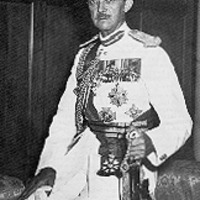Politics of violence: Malaya
Discussion about the use of violence for political purposes in Malaya. The speakers argue that good treatment of captured communists is more effective than torture.
Transcript
But torture in the proper sense of the word, can never be justified. In the lair, I would think that the proof of the pudding, lies in the fact that once we started to break the back of militant communism, the numbers of surrendered enemy personnel increased very very considerably and continuously. Speaker 2: So it is probably fair to say that the good treatment or the good and civilised treatment that these people were subjected to in their capture, was a more positive force in gaining intelligence, than the application of physical violence. Speaker 1: I am convinced of it, it came as a great surprise to me. Speaker 2: When I talked to Sir General Templar about the principles of counter-revolutionary war, he explained how he had assessed the problems that confronted him, on his arrival in Malaya. Speaker 1: I would think that of the immediate problems that I personally had to face in my time in Malaya, that if there were three things which were of vital importance for me to try and improve - the first was intelligence without a shadow of a doubt, it may well be that there is a good military , in other words, naval, army and air, intelligence system locally, it may also be that there is a good police and special branch system locally. It is improbable but it is possible , but what is quite certain is that the the two are not linked up together in one proper coordinated whole. The second one undoubtedly, was the organisation of a proper information service whereby you can get into the ears because most of them can't read, of the simple people , what the government is trying to do. This was at the time called struggle for the hearts and minds of the people. It is a bit of a cliche now but it certainly is absolutely true and an absolute necessity in a situation of this kind. And the third thing which I have devoted an immense amount of time to, ably assisted by my commissioner of police , was attempting to make the people of the country believe that the police were their friends and on their side, and not against them . View more +View less -- Edited Title
- Archivist's Original Title
- Original description
- Transcription
- Time duration
- Recording date of the original material
- Broadcast Date
- Country Name
- Recording place
- Resource Language
- Performer/Speaker
- Tags, Keywords
- Archivist Category
- Recording context
- Holding Institution of Original Materials
- Licensing Institution
- Accessing Institutions
- Copyright Information
- Physical format
- Original item number
- SEAH Identifier
- Broadcast Topic
- Description
-
Politics of violence: Malaya
-
Politics of violence: Malaya
-
Discussion about the use of violence for political purposes in Malaya. The speakers argue that good treatment of captured communists is more effective than torture.
-
But torture in the proper sense of the word, can never be justified. In the lair, I would think that the proof of the pudding, lies in the fact that once we started to break the back of militant communism, the numbers of surrendered enemy personnel increased very very considerably and continuously. Speaker 2: So it is probably fair to say that the good treatment or the good and civilised treatment that these people were subjected to in their capture, was a more positive force in gaining intelligence, than the application of physical violence. Speaker 1: I am convinced of it, it came as a great surprise to me. Speaker 2: When I talked to Sir General Templar about the principles of counter-revolutionary war, he explained how he had assessed the problems that confronted him, on his arrival in Malaya. Speaker 1: I would think that of the immediate problems that I personally had to face in my time in Malaya, that if there were three things which were of vital importance for me to try and improve - the first was intelligence without a shadow of a doubt, it may well be that there is a good military , in other words, naval, army and air, intelligence system locally, it may also be that there is a good police and special branch system locally. It is improbable but it is possible , but what is quite certain is that the the two are not linked up together in one proper coordinated whole. The second one undoubtedly, was the organisation of a proper information service whereby you can get into the ears because most of them can't read, of the simple people , what the government is trying to do. This was at the time called struggle for the hearts and minds of the people. It is a bit of a cliche now but it certainly is absolutely true and an absolute necessity in a situation of this kind. And the third thing which I have devoted an immense amount of time to, ably assisted by my commissioner of police , was attempting to make the people of the country believe that the police were their friends and on their side, and not against them .
-
0:02:25
-
1963-11-27
-
1963-11-27
-
English
-
Colonialism
-
Spoken voice
-
Radio Programme
-
Magnetic tape
-
C1398/0152
-
BBC00053
-
Military Conflict
-
Item notes: Struggle for the hearts and minds of the people of Malaya without resorting to violence. Performance notes: From a symposium about the use of violence for political purposes Talk. Format: 1 tape reel mono Media type: Lafayette Radio Electronics RT 13 2400' Mylar Part of the Allan Cooban collection Documentation: listing in pencil on box
Linked resources
| Title | Class |
|---|---|
 Gerald Templer Gerald Templer |
Person |

